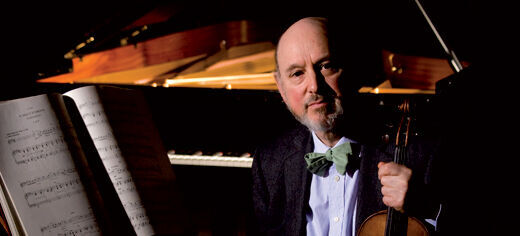
Musicians have spent almost a century misinterpreting the scores of the Classical and Romantic period in ways that would have astonished and probably horrified its most famous composers.
Clive Brown, Professor of Applied Musicology at the University of Leeds, is a world authority on historical performing practice, particularly Classical and Romantic music.
Through painstaking research based on early recordings, 19th-century editions, concert reviews and treatises of the period from Mozart to Brahms, Professor Brown has recreated styles of playing that are dramatically closer to what the composers’ contemporary audiences would have heard.
This recording was made earlier this year with his PhD student Mioyin Qu. The piano is an Erard of c.1878 in Leeds’ School of Music, while Professor Brown’s 17th century violin is strung with pure gut strings, as they would have been in Brahms' time.
Dissatisfied with more recent moves towards historically informed performance, he has pointed to a “yawning chasm” between historical evidence and contemporary practice. He says slavish adherence to composers’ musical notation misses the point.
“Musicians and scholars are still often in thrall to the agenda of the ‘reformers’ of the early 20th century,” said Professor Brown, who points to a distinction between “correct” and “beautiful” performance.
“The reformers rejected the freedoms of their predecessors, stigmatising them as accumulated abuses. They also asserted that respect for the composer’s conception consisted in adhering closely to the literal meaning of the notation.
“But overwhelming evidence shows that composers expected skilful performers to inflect the notation in ways that were governed by well-understood conventions. They wanted musicians to use a range of expressive practices that, although un-notated, were an essential part of their conception.”
“Similar conventions are still alive today in some branches of jazz and popular music – the notation, if it exists, is equally unrepresentative of the musical conception. In a sense, the best musicians of the Classical and Romantic period shared both the performing practices and the status of contemporary jazz and popular musicians.”
He added: “Most performers who market themselves as 'historically informed' and play on period instruments ignore the majority of the evidence. Some, however, are beginning to take a real interest.”
Professor Brown’s find of historically significant 19th-century editions left behind at an English boarding school a century ago provided a major boost to his work.
Boxes of music extensively annotated by Ferdinand David (1810-1873), a German violinist and composer who worked closely with Mendelssohn, Schumann and many other prominent musicians of his time, were discovered at Uppingham School in Rutland.
David’s son Paul was the school’s first director of music from 1864. When he retired in 1908, he took most of his father’s sheet music away with him. The school has now generously offered to loan what he left behind to the University’s Brotherton Library.
Stephen Williams, Director of Music at Uppingham School, said:
“For us, the scores represent the starting point for Uppingham's rich musical heritage. That they are now being brought to life, whilst also casting new light on performing styles, is tremendous.
“The spirit of enquiry and endeavour that brought Paul David from Leipzig to a small rural town surely lives on.”
Professor Brown, a violinist, together with three of his former and current PhD students who are all professional performers, will be practising what he preaches as part of the University's International Concert Series on Wednesday, September 25, when The Ferdinand David String Quartet will perform Schubert, Cherubini and Mendelssohn, using parts extensively marked by Ferdinand David between the 1840s and 1860s and using instruments set up in the manner of the 19th century.
Professor Brown heads the Arts and Humanities Research Council-funded Collection of Annotated Historical String Editions (CHASE) project at Leeds. The major four-year project looked at bibliographical problems, editorial content and implications for performance practice of 19th and early 20th century annotated editions of string music.
Further information
For interviews contact Gareth Dant, Press Officer, on 0113 343 4031 or via pressoffice@leeds.ac.uk.